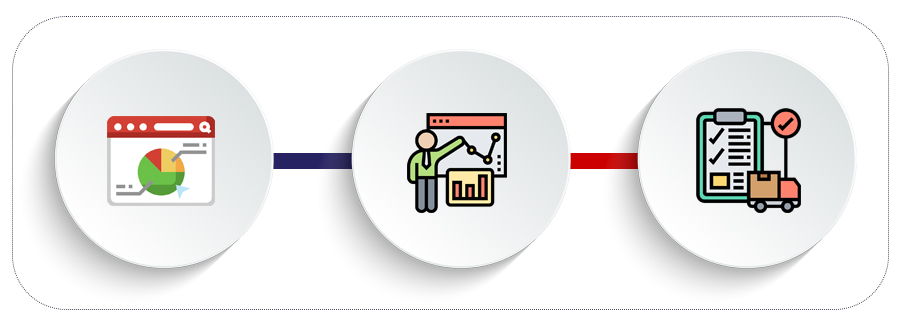
- April 11, 2022
- Prasad Kanigicherla
- 0
The logistics industry has always been an integral part of supply chain management. Though its importance had been rising over the decades, the Covid-19 pandemic is being seen as a major inflection point. If earlier logistics primarily supported manufacturers and retailers, today it operates at a bigger scale and delivers to the last-mile customer. With the boom of e-commerce, multiple industries are today relying on efficient logistical support to boost growth and productivity.
As businesses turn their attention to improved logistics, the goal is to minimize the cost of transportation, reduce disruptions, improve resource utilization, and load factor along with making the overall system efficient. While this is the aim, we aren’t quite there yet.
Supply chain management, particularly logistics, may have the infrastructural setup to meet 24X7 demands, but it isn’t yet efficient.
As the research from Ventana shows:

- 79% of companies are still using spreadsheets to plan the supply chain.
- Only about 25% of companies have integrated their supply chain with their manufacturing, procurement, and/or sales department.
- While making decisions, 54% of companies have little to no ability to measure their supply chain trade-offs across departments.
That’s not all the worry. Complex logistics means an adverse effect on the environment. As this data from the United States Environmental Protection Agency reveals, “Transportation accounts for 28% of all greenhouse gas emissions”. They summarize that “optimizing routes by just 5% for U.S. freight trucks alone would reduce carbon emission by roughly 22 million tons each year.”
A new problem has further complicated matters. Earlier last-mile delivery hadn’t assumed importance. But today, due to the changing buying behavior and rise in online shopping, logistics must ensure last-mile delivery to every customer in a time-bound manner. This has increased the need for agility and optimization. To meet the growing customer expectations, delivery must be efficient and glitch-free.
In this “new normal” of things, a static logistics model cannot work. Today, any logistics model must account for flexibility and disruptions. According to the Capgemini Supply Chain Survey 2020, 70% of companies have begun prioritizing inbound and outbound logistics since the beginning of the pandemic. This they did to align their businesses to more sustainable supply chain management.
As customer expectations rise and there is an increasing demand for time-bound delivery, the question of the hour is – are logistics and supply chain management poised to embrace the necessary changes?
The Challenges Ahead
To meet the demands of the future, the industry must overcome the constraints that are already affecting performance. Here we are talking about constraints such as cost, time, volume, and other sets of variables (including trucks, SKUs, etc.) that every organization must workaround. Once these constraints are identified, they can be resolved using data analytics.
Though it seems simple enough to identify these problems and eventually fix them, it isn’t so easy. There are several reasons for this.

- For businesses that have invested in big data and analytics, classical computing cannot process large volumes of data that is collected every day. This results in computers simplifying data, which often isn’t exhaustive or adequate.
- Decisions based on facts and figures aren’t often taken because the top management interprets data to their understanding and historical biases, which may not always be fair.
- The fact that data isn’t just a compilation of facts and figures but is an interrelationship with other overall market dynamics isn’t accounted for in classical computing.
Looking for Solutions Among Constraints
The solution to the structural constraints that we talked about is quantum computing. It promises to make transport logistics more efficient, safe, and fast. But what is quantum computing?
In regular computing, information is processed from a starting point and continues until it reaches the end of a maze to the exit point. But in quantum computing, all paths are simultaneously analyzed, while the right path is found.
Results are faster through quantum computing. Not only this, but more information can also be stored using less energy.
Quantum computing logistics is being seen as the answer to all the complications currently wearing down supply chain management. With the use of an efficient quantum processor, complicated scenarios with multiple variables can be solved – something that isn’t possible with classical computers.
Solving the Traveling Salesman Problem
Possibly one of the greatest challenges in logistics operations is the traveling salesman problem. It talks about the algorithmic challenges of finding the shortest and most efficient route between two sets of points. As supply chain and logistics get complex, the traveling salesman problem multiplies. As variables (such as truck, route, driver) get added to the equation, it adds to the complication.
For instance, if earlier a logistics team had to deal with 100 stops using 10 route options, today within these 100 stops, there can be over 3 thousand route options. As more packages get lifted for a single route, the more complex the entire system becomes. Time and cost efficiency assume prime importance, which can best be dealt with quantum computing.
KP Soft – Combining Quantum Computing and Logistics
The future of efficient logistics management is definitely quantum computing. At KP Soft, we are poised to embrace change like it’s our second nature. We believe in digital transformation with the latest technological innovations. As more and more world leaders and top businesses are adopting quantum computing, we, too, aren’t far behind. We provide quantum computing support for warehouse logistics management as well as overall logistics and supply chain management. With us as your support, recreate an agile supply chain. If your business needs the computing prowess to improve logistics management, get in touch with us today.
